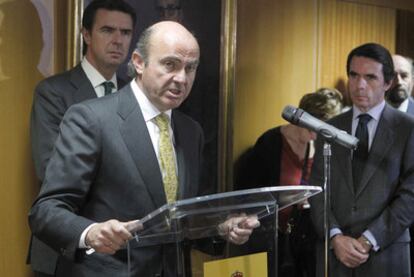PROFILE Luis de Guindos
New economy chief has his work cut out for him
"Mark my word - it is going to be Cristóbal [Montero]." These were the words from Luis de Guindos last July when EL PAÍS caught up with him at Barajas International Airport. De Guindos didn't see himself becoming economy minister in Mariano Rajoy's Popular Party (PP) government; maybe it was because he was hoping to head up the Bank of Spain, a post that will be up for grabs in about seven months.
Before the election, De Guindos was one of Rajoy's principle economic advisors. Now in office, the new PP prime minister has appointed him economy minister, giving him the monumental task, alongside new Finance Minister Montero, of whipping Spain's economy back into shape.
A man of style, De Guindos has a very broad résumé that demonstrates ample experience in the international field - something that worries many industry leaders and businessmen who believe that his main task will be to serve the markets and not local business.
"His experience at the economy ministry during the last PP government and then at AB Asesores, Lehman Brothers, the economic outlook division at Price Waterhouse and the Business Institute while he was in the private sector will allow him to confront the challenges that he is facing," said economist Emilio Ontiveros, during a panel discussion broadcast recently on CNN+ and SER radio network.
De Guindos joined the investment firm AB Asesores after working four years at the Economy Ministry, where he served as director general of economic policy, secretary general of finance, and secretary of state for the economy.
He joined AB at one of the hottest periods for the Spanish bourse when mergers and acquisitions were the common goings-on in the stock market.
Santiago Eguidazu, a former colleague at AB Asesores, recalls that De Guindos "was very intelligent, very independent with his own opinions, very talkative but with a lot of capacity to be reserved."
De Guindos never wanted to become an active member of the PP - maybe because he believed that it would take away from his independence.
Rodrigo Rato, then economy minister, saw much potential in hiring the then-young De Guindos. First, he had an excellent command of English, which permitted Rato to assign him jobs at the European commission for economic and financial Affairs. His frequent travel to Brussels allowed De Guindos to make important contacts. "His gentlemanly manner has also helped him. They say that you have to be friendly and polite whether you agree or disagree ? this enables you to make friends all over," said one PP politician.
Jordi Sevilla, a former minister under José Luis Rodríguez Zapatero who worked with De Guindos at Price Waterhouse, said he "has a lot of experience and vision to manage the economy with ease."
Political attacks
It is difficult to find anyone in the economic sector that will criticize him. But in the world of politics there are more than a few. United Left (IU) national coordinator Cayo Lara called him "the minister of markets," and Marcelino Iglesias, the Socialist secretary, said ironically: "I wish him more luck than what he had at Lehman Brothers."
Perhaps De Guindos' lowest point in his career occurred after he joined Lehman Brothers in 2004 following the PP's loss to the Socialists. He was appointed head of the global financial services firm's Spain and Portugal affiliate and immediately resigned when Lehman Brothers went bankrupt at the start of the subprime mortgage scandal. It is estimated that Spanish investors lost a billion euros. De Guindos was never able to shake off this traumatic experience until his name began popping up this year as a Cabinet candidate.

Tu suscripción se está usando en otro dispositivo
¿Quieres añadir otro usuario a tu suscripción?
Si continúas leyendo en este dispositivo, no se podrá leer en el otro.
FlechaTu suscripción se está usando en otro dispositivo y solo puedes acceder a EL PAÍS desde un dispositivo a la vez.
Si quieres compartir tu cuenta, cambia tu suscripción a la modalidad Premium, así podrás añadir otro usuario. Cada uno accederá con su propia cuenta de email, lo que os permitirá personalizar vuestra experiencia en EL PAÍS.
¿Tienes una suscripción de empresa? Accede aquí para contratar más cuentas.
En el caso de no saber quién está usando tu cuenta, te recomendamos cambiar tu contraseña aquí.
Si decides continuar compartiendo tu cuenta, este mensaje se mostrará en tu dispositivo y en el de la otra persona que está usando tu cuenta de forma indefinida, afectando a tu experiencia de lectura. Puedes consultar aquí los términos y condiciones de la suscripción digital.








































